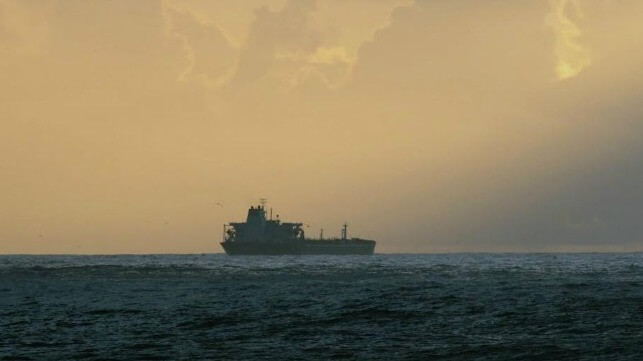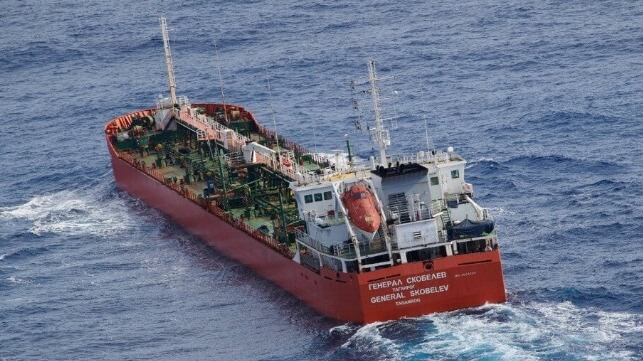Report: Add Emissions to List of Shadow Fleet Violations

There continues to be a lot of talk about all the challenges presented by the dramatic growth of the so-called shadow fleet of tankers working outside most regulations. While much of the attention has been on ships violating the G7 Russian price cap, there also continues to be a flourishing trade in Iranian and Venezuelan oil on equally problematic vessels.
Reports have focused on issues such as lax inspection standards, the use of false identities, masking identities and locations, and concerns over satisfactory insurance. Recently, there was the case of the tanker carrying Russian oil that was involved in a minor fender-bender accident off Denmark which reportedly presented falsified papers. The vessel was not detained (it was recently shot at by the Houthi in the Red Sea) but reports are that Denmark may pursue legal charges.
Add to the long list of concerns emission violations according to a new analysis from Reuters. In an effort to save money on their operations, the dark fleet as it is often called is believed to be using mostly high sulfur fuels. The International Maritime Organization four years ago in 2020 mandated the use of exhaust scrubbers on vessels still using heavy fuel oil or a switch to cleaner burning low sulfur fuels.
Environmentalists frequently cite the numbers that shipping annually causes around three percent of global carbon dioxide emissions. The industry’s efforts are aimed at reducing CO2 but also other pollutants, such as sulfur oxides, nitrogen oxides, and volatile organic compounds.
Reuters in its report highlights the depth of the problem calling out the dramatic growth in the shadow fleet. Lloyd’s List Intelligence is cited as saying the shadow fleet numbered 280 to 300 vessels before 2022 and the start of the war in Ukraine. It jumped Lloyd's estimates to 530 vessels in 2023 and now is around 630 tankers, a 14.5 percent increase.
Other sources suggest the number is much larger when all the tankers transporting Iranian and Venezuelan, in addition to Russian, oil are factored in. TankerTrackers.com reported in mid-May for example that there were 163 VLCCs involved in the Iranian oil trade and just yesterday they said two vessels were added to the dark fleet. Allianz in its annual industry review speculated the dark fleet could be as many as “1,400 vessels, roughly a fifth of the overall global crude oil tanker fleet.”
"The dark fleet has gone on steroids,” Lloyd’s List Intelligence’s Michelle Wiese Bockmann told Reuters. “And the deceptive shipping practices that they're engaging in are getting more and more complex and sophisticated."
Reuters cites an analyst who says many of the vessels lack scrubbers. Yet they are buying high-sulfur fuels in Russia, saving as much as 20 percent on their fuel costs.
The report admits it is difficult to gauge the extent of non-compliance with IMO regulations, but they cite an increase in vessel detentions due to sulfur rule violations. Reuters reports at least 10 ships have been detained so far in 2024, up from six in the same period of 2023. For the whole of 2022, they report only five vessels were detained on sulfur violations. Further, they calculate that nine of the 10 detained vessels had made calls in Russia.
There are reports that the EU is looking at more stringent sanctions and efforts to further reign in the shadow fleet. The U.S. sanctions have worked at stopping some vessels but only a small fraction of the shadow fleet has been affected with the vast majority of the ships continuing to operate and avoid regulations.
UK Asks Brokers to Give Up Profitable "Dark Fleet" Tanker Sales

More than a few Western tanker brokers have had a profitable run since the imposition of restrictions on Russia's oil trade. Over the course of the past two years, Russia-serving operators have built up a 750-strong "dark fleet" of aging secondhand tankers, often paying outsize prices for scrap-ready tonnage. Many of these deals have been negotiated through London-based brokerage houses, and the UK's Department for Business & Trade is encouraging industry-leading brokers to forego the profits associated with Russia-linked business and comply with sanctions measures instead. To clarify its expectations, it has issued a list of the telltale signs of a "dark fleet" sale, echoing past industry news coverage and analysts' reports.
The Western sanctions on Russian oil include a ban on facilitating cargoes valued over $60 per barrel. Since most cargoes are now sold for more than that limit, and U.S. and UK authorities have begun enforcing the ban, Western tanker owners and insurers have been stepping away from the Russian oil trade. This has prompted a new constellation of Russia-serving operators to amass their own fleet by quietly buying up used Western tonnage, typically using opaque ownership structures in permissive third countries.
"Some of these tankers may be old (15+ years) and sold at a significant premium above the historic market price for these types of tankers given Russia’s urgent requirements for vessels. As such this market is likely to remain lucrative to prospective sellers," noted the agency. "It will therefore be important for industry actors to be mindful of this context, capturing it within any due diligence processes."
Tankers are a "restricted good" under sanctions on Russia, and the agency reminded brokers that they are not allowed to facilitate these transfers, even when the sale takes place through an intermediary or a third nation. Well-known risk factors to watch for include:
- high prices for older vessels
- unusual country of ownership, or country of ownership linked to the existing "dark fleet"
- vague or fraudulent documentation
- obscure, complex ownership structures
- buyer linkages to restricted goods, Russian interests, or sanctioned business partners
- Unusual or opaque payment methods
- Buyer reticence or lack of transparency during the due diligence process
- High-risk trade patterns and destinations, including ports adjacent to sanctioned countries, voyages outside of normal trade patterns, or nations known to tolerate sanctions violations
"Industry participants are advised only to conclude deals where they are confident that a process of cross-checking of these risk indicators provide reassurance that compliance thresholds are met," warned the department. "Any non-compliance with UK sanctions is a serious offense and punishable through large financial penalties or criminal prosecution."
No comments:
Post a Comment